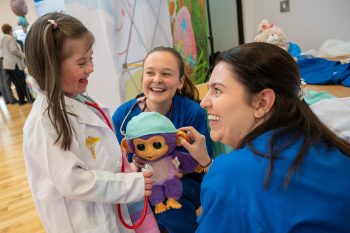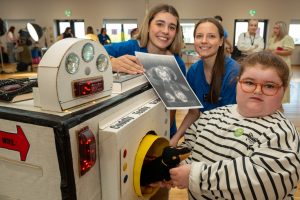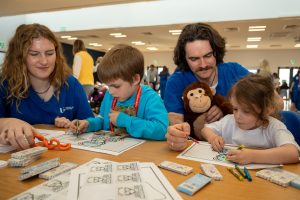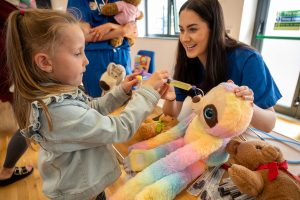23/04/2025

We, in partnership with Ulster University School of Medicine’s Child Health Society, and Altnagelvin Parents Group, invited children living with medical conditions to demystify clinical environments in a safe and playful way.
For many children, hospitals can feel intimidating, especially for those who spend a significant amount of their lives undergoing medical treatments. Opening its doors for a second year, the Teddy Bear Hospital aims to turn fear into familiarity by introducing young participants to medical scenarios using their most trusted companions – their teddy bears.
Hosted by the School of Medicine’s Child Health Society, graduate-entry medical students are welcoming children and their families for hands-on activities such as clinical examination techniques, familiarisation of medical equipment and PPE, and myth-busting sessions. These activities are designed to promote a positive connection with healthcare settings while demystifying the process.
 Examples of activities on the day include:
Examples of activities on the day include:
- Getting to wear child-sized scrubs
- Putting their teddy through pretend MRI and X-ray machines
- Getting their bloods ‘taken’
- Having a nasogastric tube or cannula ‘fitted’
- Visiting the ‘dentist’
 One parent said:
One parent said:
“My child doesn’t like attending hospital appointments for bloods or check-ups, and is afraid of doctors’ uniforms. He is a hands-on and visual learner. This is will hopefully help him see that he doesn’t have to worry.”
Deirdre Cassidy, Treasurer of Altnagelvin Parents Group, said:
“As a small, local charity that supports families who have children living with lifelong and life limiting medical conditions, it has been our pleasure to work in partnership with Ulster University Child Health Society and the WHSCT Health Improvement Equality and Involvement Department to co-design this year’s Teddy Bear Hospital.
“The children attending have experienced a lot of hospitalisation and medical procedures in their short lifetime as a result of their medical conditions. The aim was to develop a fun and engaging project, focusing on promoting a positive image of the healthcare profession and promoting healthy lifestyles, while aiming to reduce fears children may have developed.”
Lisa Storey, Child Development Interventions Coordinator at the Western Trust, said:
“It has been our pleasure to work with partners involved in this health initiative and to co-produce the event with the parents from Altnagelvin Parents Group. They have provided insight into uncertainties and fears their children may have developed due to repetitive, necessary hospitalisations. The valuable testimonies have helped shape all the medical play stations at the event.
“Bringing together health and education will hopefully have a positive and lasting memory for every family taking part. My colleagues in the Health Improvement Equality and Involvement department are also providing information stalls at the event, on topics such as the importance of promoting healthy lifestyles, healthy eating, physical activity and positive mental health.”
Sinéad Doyle, Ulster University Medical Student and Child Health Society member, added:
“As we host our second Teddy Bear Hospital event, the results have been truly rewarding for our Child Health Society. Witnessing children overcome their fears of medical procedures and environments while caring for their favourite teddy bears is heartwarming. Hospitals can be intimidating for young kids, so being part of this initiative is a brilliant way to connect with the community and help children feel more at ease in healthcare settings.”
 Foundation Dean of Ulster University School of Medicine, Louise Dubras, commented:
Foundation Dean of Ulster University School of Medicine, Louise Dubras, commented:
“Part of the vision for our School of Medicine is to graduate community-focused, globally ambitious doctors. Through student projects such as the Teddy Bear Hospital, we see community focus and community impact right from when medical students join us, and we are very proud of their leadership to establish a local branch of this UK-wide initiative which aims to improve children’s experience of healthcare in hospitals by reducing their anxiety.”
By bridging the gap between young patients and the healthcare system, the Teddy Bear Hospital hopes to make an enduring impact, one teddy bear hug at a time.




